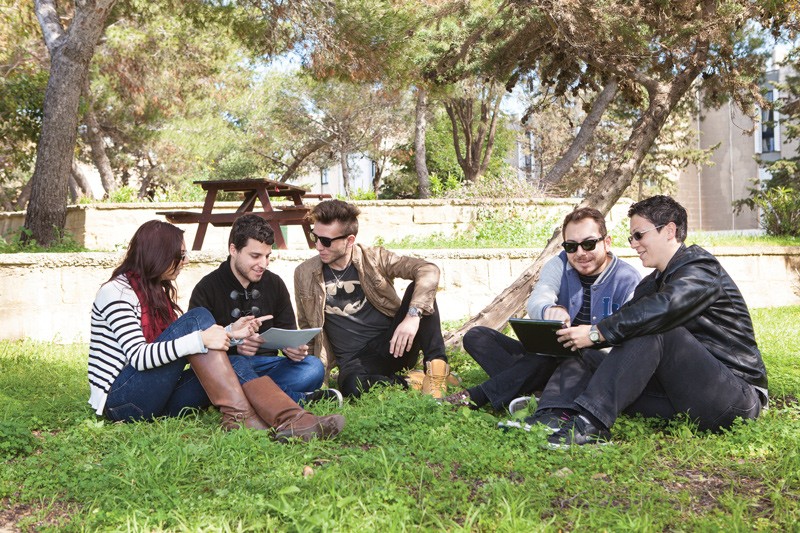University can be incredibly stressful. Staff perform high level work with plenty of academic responsibilities, while balancing a private life and leisure time. The number of students at University is rising every year. For academic and support staff this means a more intensive workload, pressure, and stress. For students it is the pressure of attaining good results, maintaining relationships, and other social and emotional wellbeing issues, such as coping with peer pressure, struggling with deadlines, and worries about the future. Numerous studies suggest that examinations negatively impact on student health and wellbeing. Some coping strategies and time management programmes have evolved at the University of Malta, for example by the University Chaplaincy. Such well-meaning initiatives are good and do good, but tend to happen sporadically and around examination time.
Many University of Malta students balance multiple identities. They often fall outside the typical demographic of an 18-year-old sixth form school leaver. Our students come from diverse socio-economic backgrounds, and may be studying full-time or part-time, with a variety of life roles: mature students, women with care responsibilities, persons challenged by disability or facing problems due to sexual orientation. Whatever the situation in life, each diverse identity places increased demands upon the students’ time and private life. These demands influence their University experiences, study perceptions, and learning style. Their peers might treat them differently due to their background.
“A social wellbeing policy will help foster confidence in its approach to academic learning, and to eliminate discrimination in favour of a more inclusive learning environment”
Besides worries about assignment deadlines and writing exams, many students are also in employment. I am not sure this trend is in line with University of Malta regulations, nevertheless, that is the situation. Students also worry about future prospects with no guarantee of secure employment after finishing their studies. So it is not only academic concerns that come in the way of student social wellbeing, and these may lead to high levels of stress, anxiety or frustration, depressed mood, difficulties with time management, procrastination, poor concentration, withdrawal from friends or family, or physical symptoms such as headaches, sleep problems, and exhaustion. University life presents numerous stress factors that may trigger off mental health difficulties.
Students experiencing stress are normally recommended psychological intervention and counselling, which may be beneficial for extremely stressed students. However, research suggests that physical activity helps improve mental health and wellbeing. The University of Malta, through its Work Resources Fund, promotes cycling through the Green Travel Plan. The initiative is more about sustainability and the environment, apart from a solution to the parking problem. However, cycling does improve our mental health and wellbeing, and is a free personal de-stressor by taking our mind off work or study, and leads to healthier lifestyle choices. 
A social wellbeing policy for University will help foster confidence in its approach to academic learning, and to eliminate discrimination in favour of a more inclusive learning environment. Indeed, the principles of equality and diversity such as gender or disability are essential for a true understanding of social wellbeing, and these same principles need to be included in our University’s policy document and implemented in practice. Diversity in a dynamic, intellectual environment enriches professional and educational experiences for both staff and students.
Diversity on campus is needed and important for a healthy University. Internationally, social wellbeing on campus is being promoted through an organisational structure embedded into the ethos, culture, policies, and daily practices of a university. A social wellbeing policy includes an improved occupational health and safety system, and a commitment to address mental wellbeing, physical inactivity, unhealthy eating and substance misuse. The University needs constant commitment to positively influence the life and work of all staff and students.

The University is encouraged to guard the integrity of its communication system. Collaboration and open communication fosters conversations and relationships necessary to bring about social wellbeing. The communication process needs to be trusted and confidential for team spirit and social wellbeing. For instance, I would strongly argue for an email policy that discourages unnecessary use of bcc in emails, as the practice of not telling the original addressee is unethical and downright deceitful.
The University of Malta could establish itself as a national contact point on the European Network for Health Promoting Universities (see www.eurohpu.aau.dk). It would commit the University to place social wellbeing high on its policy agenda. A working document published by the World Health Organisation Regional Office for Europe provides guidance on how to set up and develop a health-promoting university project, which would enhance and protect the social wellbeing of all staff and students.
Finally, I would also suggest an exploratory research study about aspects of university life, stress factors in teaching and learning activities, and how these impact on individual experiences. The aim is to understand the general quality of life, and how this can be improved for an informed social wellbeing policy document at the University of Malta.
This article is based on a paper Camilleri-Cassar presented at a seminar organised by the Faculty for Social Wellbeing in October 2013.
Read more here:
– Carroll, A. (2011) ‘Exploring the link between equality, diversity and wellbeing.’ In Marshall, L. and Morris, C. (eds) Taking Wellbeing Forward in higher education: reflections on theory and practice, University of Brighton Press.
– Hagarthy, D. and Currie, J. (2012) ‘The Exercise Class Experience: an opportunity to promote student wellbeing during the HSC’, Journal of Student Wellbeing, vol. 5(2):1-17.
– Hall, C., Ramm, J. and Jeffery, A. (2011) ‘Developing the University of Brighton as a Health Promoting University: the story so far.’ In Marshall, L. and Morris, C. (eds) Taking Wellbeing Forward in higher education: reflections on theory and practice, University of Brighton Press.
– UniHealth 2020: Mission Statement, www.eurohpu.aau.dk





Comments are closed for this article!